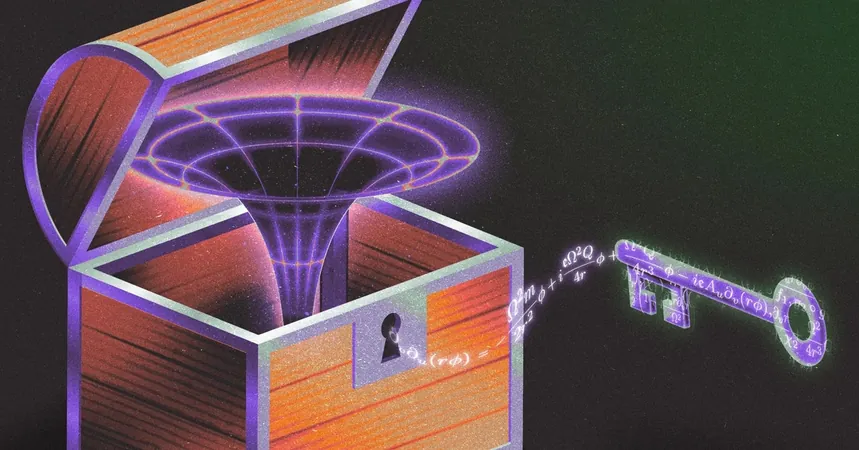
Stephen Hawking’s 50-Year Myths Debunked: Extremal Black Holes Could Exist!
2024-09-15
Stephen Hawking’s 50-Year Myths Debunked: Extremal Black Holes Could Exist!
In a stunning turn of events, researchers have overturned decades-long beliefs regarding the cosmos's most mysterious entities—black holes. These cosmic giants, known for their gravitational pull so strong that not even light can escape, have been instrumental in exploring the fabric of space-time and gravity. But could there be a type of black hole—an "extremal" black hole—that actually exists?
Traditionally, scientists believed that black holes could attain maximum spin or charge based on their mass, leading to a class of black holes termed "extremal." These theoretical constructs are marked by unique traits, including a surface gravity of zero at their event horizon, which means they do not attract matter anymore. If an object is nudged too close, however, it would still succumb to the black hole’s intense gravitational pull.
In 1973, renowned physicists Stephen Hawking, James Bardeen, and Brandon Carter argued against the possibility of these extremal black holes, asserting they cannot form in our universe. But researchers Christoph Kehle and Ryan Unger of the Massachusetts Institute of Technology and Stanford University have recently challenged this long-held notion with groundbreaking mathematical proof that indicates otherwise.
Their findings, described as "beautiful and technically innovative" by experts in the field, suggest that there are no known laws that inherently prevent the existence of extremal black holes. As Mihalis Dafermos of Princeton University pointed out, Kehle's and Unger's work implies a cosmos rich with possibilities that might challenge our understanding of black hole physics.
However, while the proof opens up avenues for theoretical exploration, it does not confirm the existence of extremal black holes in our universe. Gaurav Khanna from the University of Rhode Island warns that even if a solution exists mathematically, it doesn’t guarantee that nature would realize it practically. The implications of discovering such a phenomenon—should one ever be detected—could compel scientists to rethink fundamental physics.
Delving deeper into the implications, the concept of extremal black holes was built upon earlier theories of black hole thermodynamics set forth by Hawking and his colleagues. They suggested that a black hole's surface gravity couldn't decrease to zero, casting doubt on the potential for extremal black holes to exist. This stance was bolstered by a proof from physicist Werner Israel in 1986, which led many to believe the case was closed.
Kehle and Unger, however, discovered through their exploration of charged black holes that it is indeed possible to transition a regular black hole into an extremal one within a finite timeframe. Their experiments demonstrated that by manipulating electric charge, you could actually reduce a black hole's surface gravity to zero, effectively disproving Israel's proof.
Intriguingly, their research also indicates that the formation of an extremal black hole does not lead to an obscure entity known as a naked singularity, which has been a point of concern among theorists. Instead, they found that by correctly calibrating the charge added to matter, one could create an extremal black hole while avoiding the potential pitfalls of naked singularities.
As Kehle and Unger shift their focus toward the possibility of extremal black holes associated with spin rather than charge, the scientific community is abuzz with anticipation. Their findings could pave the way for exploring the concept of near-extremal black holes—phenomena that are presupposed to be abundant across the universe.
While the quest is still in its nascent stages, the duo hopes to shed light on whether these tantalizing cosmic entities exist in reality. As Khanna aptly notes, we shouldn't dismiss the potential for extremal black holes merely because they sound extraordinary; the universe is far more mysterious than we can imagine.
In conclusion, the overturning of established beliefs regarding extremal black holes opens fresh pathways for exploration in the realm of black hole physics and could lead to profound revelations about our vast universe. Buckle up, because the cosmos is full of surprises just waiting to be uncovered!
 Brasil (PT)
Brasil (PT)
 Canada (EN)
Canada (EN)
 Chile (ES)
Chile (ES)
 España (ES)
España (ES)
 France (FR)
France (FR)
 Hong Kong (EN)
Hong Kong (EN)
 Italia (IT)
Italia (IT)
 日本 (JA)
日本 (JA)
 Magyarország (HU)
Magyarország (HU)
 Norge (NO)
Norge (NO)
 Polska (PL)
Polska (PL)
 Schweiz (DE)
Schweiz (DE)
 Singapore (EN)
Singapore (EN)
 Sverige (SV)
Sverige (SV)
 Suomi (FI)
Suomi (FI)
 Türkiye (TR)
Türkiye (TR)